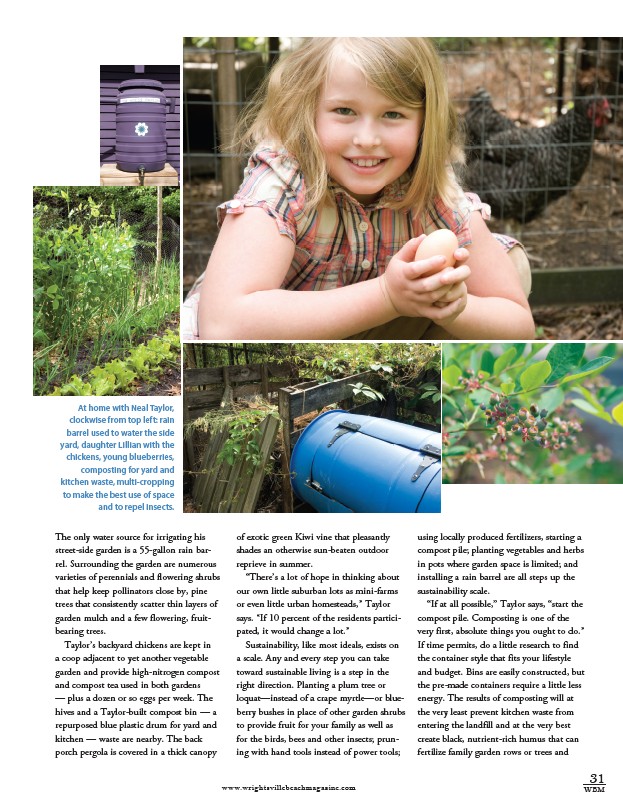
31
The only water source for irrigating his
street-side garden is a 55-gallon rain barrel.
Surrounding the garden are numerous
varieties of perennials and flowering shrubs
that help keep pollinators close by, pine
trees that consistently scatter thin layers of
garden mulch and a few flowering, fruitbearing
www.wrightsvillebeachmagazine.com WBM
trees.
Taylor’s backyard chickens are kept in
a coop adjacent to yet another vegetable
garden and provide high-nitrogen compost
and compost tea used in both gardens
— plus a dozen or so eggs per week. The
hives and a Taylor-built compost bin — a
repurposed blue plastic drum for yard and
kitchen — waste are nearby. The back
porch pergola is covered in a thick canopy
of exotic green Kiwi vine that pleasantly
shades an otherwise sun-beaten outdoor
reprieve in summer.
“There’s a lot of hope in thinking about
our own little suburban lots as mini-farms
or even little urban homesteads,” Taylor
says. “If 10 percent of the residents participated,
it would change a lot.”
Sustainability, like most ideals, exists on
a scale. Any and every step you can take
toward sustainable living is a step in the
right direction. Planting a plum tree or
loquat—instead of a crape myrtle—or blueberry
bushes in place of other garden shrubs
to provide fruit for your family as well as
for the birds, bees and other insects; pruning
with hand tools instead of power tools;
using locally produced fertilizers, starting a
compost pile; planting vegetables and herbs
in pots where garden space is limited; and
installing a rain barrel are all steps up the
sustainability scale.
“If at all possible,” Taylor says, “start the
compost pile. Composting is one of the
very first, absolute things you ought to do.”
If time permits, do a little research to find
the container style that fits your lifestyle
and budget. Bins are easily constructed, but
the pre-made containers require a little less
energy. The results of composting will at
the very least prevent kitchen waste from
entering the landfill and at the very best
create black, nutrient-rich humus that can
fertilize family garden rows or trees and
At home with Neal Taylor,
clockwise from top left: rain
barrel used to water the side
yard, daughter Lillian with the
chickens, young blueberries,
composting for yard and
kitchen waste, multi-cropping
to make the best use of space
and to repel insects.